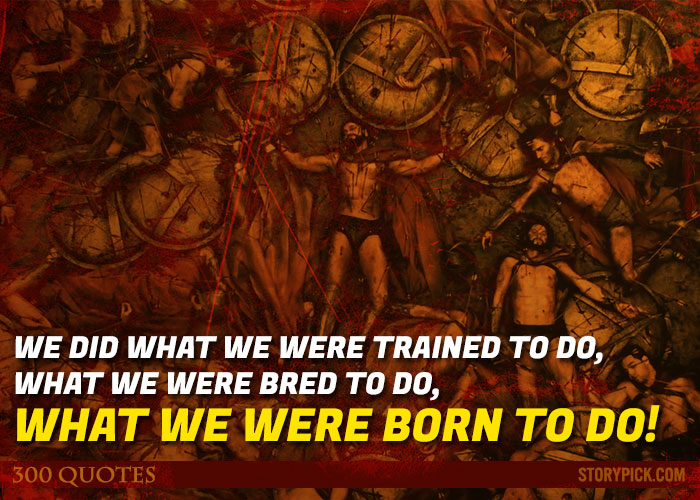

#Movie 300 quotes movie#
(Author’s note: the Benedict Cumberbatch movie about this epic corporate battle is superb.)Īt regular intervals, Bell pauses her technological narrative to update readers on developments in climate science. It was electricity that finally met the demand for clean, odorless, and safe lighting, but only after the dramatic “current war” (DC vs AC) between Thomas Edison and George Westinghouse, a war Westinghouse won with a spectacular display of AC-powered lighting at the World Columbian Exposition in Chicago in 1893. Yes, petroleum products replaced whale oil in many places and products, but, Bell points out, “in 1951 more whales were killed worldwide than New Bedford’s ships took in a century and a half.”

Recalling the 1861 Vanity Fair cartoon in which whales celebrate the discovery of oil, Bell nixes the idea that each stage marked a clean succession. So a string of competitors arose: whale oil, distillations from coal, distillations from petroleum, and, finally, electricity, which was first generated by burning coal. The demand for light – for workĪnd when steam engines were adapted for manufacturing, they created a demand for lighting so that production was not limited to daylight hours. When James Watt significantly improved the power and efficiency of the steam engine, other inventors soon imagined steam-powered railways and ships.

Thus the need to follow the story of coal and the technologies it gave rise to, most notably the steam engine, which was first used to pump water out of the mines that supplied the coal it burned. Bell plausibly argues that Tyndall could have encountered Foote’s work but would likely have dismissed it because she was a woman. John Tyndall is the scientist usually credited with making this inference – in 1859. Aware that burning coal released the gas, it was easy to infer that if CO2 raised the temperature in a bell jar, then an atmosphere richer in CO2 could warm the planet. She starts on the first page, with Eunice Newton Foote, “a scientist, inventor, and women rights campaigner living in Seneca Falls, New York, who in 1856 first warned the world that an atmosphere heavy with carbon dioxide could send temperatures soaring.”įoote’s innovative experiments with carbon dioxide, however, were possible only because other scientists, such as Joseph Black, Antoine Lavoisier, and Joseph Priestley had previously sorted out the components of air. A leading early scientist … dismissed because of her gender? But with an eye on environmental and social justice, Bell also tells readers who and what has been left out of traditional histories.

Covering all commercial forms of energy, describing their sources and uses as well as their impacts, Bell intertwines her tales to include the big names in engineering and science. Bell’s task in her “epic history” is to explain how fossil fuels came to power modern civilization and also explain how scientists came to realize this was a problem. This experiment began in earnest in the 1700s and continues to this day. Climate change is “ Our Biggest Experiment.” In 1956, American scientist Roger Revelle likened humanity’s burning of vast quantities of fossil fuels to “a large-scale geophysical experiment.” Slightly more than 30 years later, British Prime Minister Margaret Thatcher described the still unchecked emission of greenhouse gases as “a massive experiment.” After another 30-year interval, and decisive evidence that the world wouldn’t run out of fossil fuels any time soon, as Revelle had thought, the superlative seemed warranted. The epic history shows how well-known industrialists and inventors revolutionized human civilization with technology that relied on burning fossil fuels while shedding new light on the stories of the many scientists and activists who warned long, long ago that rising CO2 levels could result in the warming of Earth’s climate.īell, who has a PhD in Science Communication, took the title of her 330-page book from two quotes often repeated in climate circles. A comprehensive new book by climate campaigner and science writer Alice Bell presents a compelling and very readable review of the centuries-long history of events that led to the current climate crisis.


 0 kommentar(er)
0 kommentar(er)
